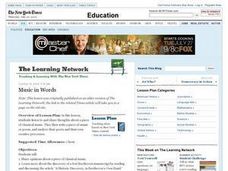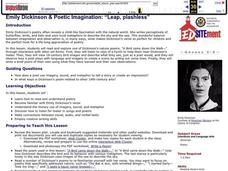Curated OER
Animal Fact or Fiction?
Read and discuss the article "Welcome to Cicadaville (Enter at Your Own Risk)" to gain a better understanding around the confusion regarding cicadas and locust swarms. In groups your young analysts research statements about animals to...
Curated OER
Music in Words
Your class can build strong, well-represented opinions about the music they hear. They listen to, and share thoughts about, a piece of classical music. Then they write a piece of music or a poem, and analyze their peers' work and their...
Curated OER
Comparing The Odyssey and "The Lotus Eaters"
Ninth graders compare the development of text in Book 5 of "The Odyssey" to Alfred Lord Tennyson's poem "The Lotus Eaters." After discussing the comparison's of the two text within a group, they create an original piece of work or...
Curated OER
The Tell-Tale Hearts of Writers
Knock, knock, knock...Creep out your class with a critical thinking lesson focused on word relationships in Edgar Allen Poe's "The Tell-Tale Heart." They investigate the relationship between word choice, mood, and interpretation of a...
Curated OER
Ornithology and Real World Science
Double click that mouse because you just found an amazing lesson! This cross-curricular Ornithology lesson incorporates literature, writing, reading informational text, data collection, scientific inquiry, Internet research, art, and...
Curated OER
Do You Haiku? We Do!
Third graders try their hands at writing Haiku, a form of Japanese poetry. Haiku is usually 17 syllables in three-line form. This engaging lesson has many excellent worksheets and website imbedded in the plan. They share their finished...
Curated OER
The Sonnet Challenge
High schoolers are given information about two popular sonnet forms-English and Italian. They are given the rules for writing a sonnet. Students are asked what type of sonnet they would use. They are each given a sheet of paper and...
Curated OER
Show Don't Tell
Students review the Show Don't Tell method of writing haiku poetry. They practice distinguishing poetic language from academic language and create poems based on images, not explanations.
Curated OER
Analyzing Poetic Devices: Robert Hayden's "Those Winter Sundays" and Theodore Roethke's "My Papa's Waltz"
Students examine how Robert Hayden and Theodore Roethke incorporate poetic devices to convey meaning in the poems, 'Those Winter Sundays,' and 'My Papa's Waltz.' They listen to audio clips, explore websites, and write an analysis of the...
Curated OER
Snowflake Bentley
Learners explore crystals through the story Snowflake Bentley and then create crystal pictures of their own. In this interdisciplinary lesson, they create a crystal web chart on chart paper, design artificial snowflakes, and write poems...
Curated OER
"Here's much to do with hate, but more with love": The Prologue in Romeo and Juliet
Students participate in a guide close reading of the Prologue to Romeo and Juliet. They write a prologue sonnet to another piece of literature they have read.
Curated OER
America's Civil Rights Movement, Activity Five
Young scholars read and write poems for two voices about the Civil Rights Movement.
Our White House
The Our White House Inauguration Celebration Kit for Kids!
Get the youngest American citizens involved in the presidential election and inauguration with a set of social studies activities. Focusing on the history of presidential inauguration ceremonies, learners draft their own poems, design...
Curated OER
Hearing the Poetry of Langston Hughes Through the Sounds of Jazz
Students have an appreciation of Langston Hughe's poetry and his use of jazz rhythms, have the ability to read poetry closely, and freewrite to gain a fresh perspective on music and literature.
Curated OER
Poetry and Paintings: A Comparative Study
Students find words for different feelings: sad, happy, annoyed, bored, puzzled, etc.
They think of colors which seem to fit each feeling. A painting is introduced and they are asked to verbalize how it makes them feel. What mood does...
Curated OER
Haiku - Poetry of the Samurai Warrior
Students research the Samurai and their Haiku Writings. Students use internet research to gather information about the ancient Japanese Samurai. The students then create individual Haiku writings, and a cultural day is designated when...
Curated OER
What Is Haiku
Students engage in a lesson that is concerned with the study of poetry while focusing on Haiku as a format. They practice reading a variety of different pieces of literature in order to increase exposure. Students discuss the author's...
Curated OER
Writing in Math Class
Students brainstorm and discuss ways math is all around them, explain in writing how they solve math problems, describe mathematical ideas in writing, and create original story problems.
Curated OER
My Secret War: Lesson 5
Fifth graders determine how freedom comes with rights and responsibilities through literature and poetry about World War II. In this World War II lesson, 5th graders use the letters in the word "infamy" to write an acrostic poem. They...
Curated OER
"Leap, Plashless": Emily Dickinson & Poetic Imagination
Students read and explore one of Emily Dickinson's nature poems, "A Bird Came Down the Walk-" through interaction with a variety of art forms. Clips of a hymn to hear meter and the viewing of bird images exposes them to the language and...
Curated OER
"World enough, and time"-Andrew Marvell's Coy Mistress
Discuss tone and imagery with Andrew Marvell's "To His Coy Mistress." In an attempt to get his fair lady to consummate their relationship, he write a poem urging her to seize the day! Introduce the author to your high school class,...
Curated OER
Dulce et Decorum est by Wilfred Owen
It is entirely fitting and proper that Wilfred Owen’s powerful “Dulce et Decorum Est” is the poem used for an exercise in close reading, discussion, analysis, and argumentative writing. Class members discuss focus questions in pairs,...
Curated OER
Disasters (Natural & Man-made)
Young scholars chose a natural or man-made disaster, such as a tornado or an oil spill, to research using the assigned web sites. They choose a presentation type from a list which includes poetry, radio broadcasts, and safety brochures,...

























